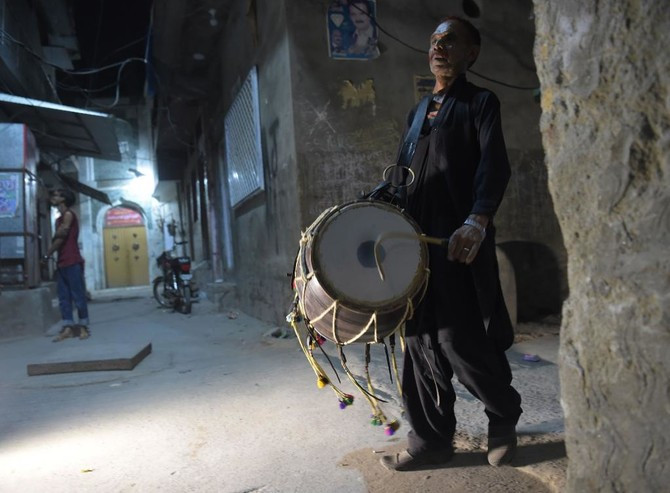
Ramazan drummers, who have long been an integral part of the sehri waking rituals in Rawalpindi, are gradually fading into obscurity as more and more people turn to digital alarms for their morning calls.
For centuries, the rhythmic beat of drums at sehri time has awakened the populace from their slumber during the holy month of Ramazan. However, this age-old tradition is now facing a decline as mobile phone alarms take precedence.
The traditional practice of drummers circling neighbourhoods to wake people for sehri not only served as a wake-up call but also provided a source of income and employment for many. On Eid, these drummers would receive “Eidi” or festive cash from each household they woke up throughout the month.
In addition to cash, families would also give them essential items like sugar, flour, and rice, reflecting a time of communal support and generosity.
In the past, the absence of loudspeakers in mosques and poor timekeeping made it challenging for people in the Indian subcontinent to wake up for sehri during Ramadan. The drummers’ rhythmic beats and chants served as a vital reminder for families to prepare their pre-dawn meal.
However, with the advent of the new century and technological advancements, this traditional system has seen a gradual decline. Mosques now use loudspeakers to announce the sehri call, rendering the drummers' role less necessary. Additionally, the rise of social media platforms and mobile alarms has further diminished the demand for drummers.
While this traditional practice persisted until the 1990s, it began to wane as scientific progress altered the landscape of waking rituals. The younger generation, accustomed to digital alarms notifications, has largely abandoned the old drumming tradition.
Another short-lived method involved reciting naats in the streets to wake people for sehri, but this too gave way to modern communication technologies. Today, platforms like TikTok, Facebook, and WhatsApp serve as the primary means of staying awake until dawn for Sehri.
In this era of rapid technological advancement, old customs like drumming and reciting naats are gradually disappearing. Families now stay awake until dawn with the help of social media, marking a significant shift in Ramadan waking rituals. As science progresses, traditional practices give way to modern conveniences, reshaping the cultural fabric of communities like Rawalpindi.
Published in The Express Tribune, March 26th, 2024.



1719660634-1/BeFunky-collage-nicole-(1)1719660634-1-165x106.webp)

1732276540-0/kim-(10)1732276540-0-165x106.webp)


1726722687-0/Express-Tribune-Web-(9)1726722687-0-270x192.webp)









COMMENTS
Comments are moderated and generally will be posted if they are on-topic and not abusive.
For more information, please see our Comments FAQ